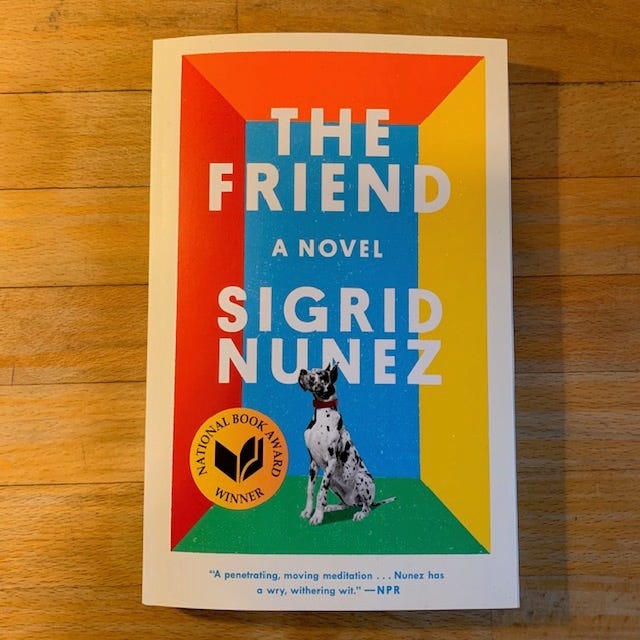Books on GIF #106 — ‘The Friend’ by Sigrid Nunez

Welcome to the latest edition of Books on GIF, the animated alternative to boring book reviews. This Sunday's selection is ‘The Friend’ by Sigrid Nunez.

It’s been an emotional rollercoaster for me since my last newsletter. There was the high of Books on GIF turning 3 earlier this week. There was the low of some tough days at work that derailed my focus on writing this review. And then there’s this novel, a beautiful and powerful meditation about friendship and grief that just bummed me out. ‘The Friend,’ which won the National Book Award, is narrated by an unnamed woman writing to a close male friend who has committed suicide. She’s asked by the friend’s third wife to take care of his now-orphaned Great Dane, Apollo. (None of the characters are named besides the dog.) She writes about how she’s getting along without him and how much she misses him, along with a one-sided discussion on a range of other topics including literature, writing, violence against women and the indignity of being watched by strangers while your enormous dog poops in the street. How the woman comes to bond with Apollo, who ultimately helps her process her grief, was my favorite part of the book. The dog is wary of the woman at first, but when she starts to read to him aloud he comes and sits beside her. Eventually, Apollo gently uses his mouth to bring her books to read to him. I thought that was a great moment. I’ve never imagined reading out loud to my cat. Would it be worth a try? Lola sits with me all the time when I’m reading. It’s often like:

‘The Friend’ is not only an exploration of friendship between human beings, but also between humans and animals. It made me think about the emotional labor we force upon pets to maintain our wellbeing or to make us feel better. The woman wonders about Apollo: What does he think about being pressed into service as an empathetic friend? Is this a form of slavery? Does he care about human emotions? How does he understand them? Does he have emotional needs? Does he feel grief over his lost master? Does reading to him help him process that grief? And other questions: Do animals really love us back? Does the cat’s purr translate into affection, or is it just a sound they make? The idea that my cat might not love me, and that a purr could be meaningless had me like:

How little we know about the interior life of animals, and of our friends. The woman tells us that her friend’s death came seemingly out of nowhere, and that he didn’t leave a note explaining why he did it. Could it have been because he was getting older, and losing his sexual virility? Could it be the ennui of existence? Like:

It’s unclear. Because how often do we really press our friends about how they’re coping with life? ‘The Friend’ reminded me how much we’ve all come to rely on social media to keep tabs on friends. But Facebook, Twitter and Instagram are poor substitutes for human contact, and you never know who is despairing behind a well-curated timeline — unless you ask. While reading this book, I vowed to try to be a better friend by reaching out more, to check in and ask:

On a random side note, I appreciated how this book acknowledged that ‘It’s a Wonderful Life’ is a profound and life-affirming movie. If you disagree, you are just wrong. The sequence where George despairs and contemplates throwing himself off the bridge only to be saved by the angel who gets him to see how important his life has been to others and how much he is loved by his friends gets me every time:

Given the downer subject matter of ‘The Friend,’ it’s hard to be effusive about it. But I loved it for its beautiful writing and its graceful depiction of mourning. This might seem weird, but I felt this book radiated something like empathy, as if it were telling the reader it understood the weight of sadness and loss, and that it was here to help and console. ‘The Friend’ is a fantastic book, and you should all read it.
How it begins:
During the 1980s, in California, a large number of Cambodian women went to their doctors with the same complaint: they could not see. The women were all war refugees. Before fleeing their homeland, they had witnessed the atrocities for which the Khmer Rouge, which had been in power from 1975 to 1979, was well known. Many of the women had been raped or tortured or otherwise brutalized. Most had seen family members murdered in front of them. One woman, who never again saw her husband and three children after soldiers came and took them away, said that she had lost her sight after having cried every day for four years. She was not the only one who appeared to have cried herself blind. Others suffered from blurred or partial vision, their eyes troubled by shadows and pains.
The doctors who examined the women—about a hundred and fifty in all—found that their eyes were normal. Further tests showed that their brains were normal as well. If the women were telling the truth—and there were some who doubted this, who thought the women might be malingering because they wanted attention or were hoping to collect disability—the only explanation was psychosomatic blindness.
In other words, the women’s minds, forced to take in so much horror and unable to take more, had managed to turn out the lights.
This was the last thing you and I talked about while you were still alive. After, only your email with a list of books you thought might be helpful to me in my research. And, because it was the season, best wishes for the new year.
My rating:

‘The Friend’ by Sigrid Nunez was published by Riverhead Books in 2018. 212 pages. $14.40 at Strand Book Store.

In two weeks you’ll get a review of ‘The Seas’ by Samantha Hunt. Also in the queue are ‘The Autobiography of Gucci Mane’ by Gucci Mane, ‘The Secret Life of Plants’ by Peter Tompkins and Christopher Bird, and ‘Sing, Unburied, Sing’ by Jesmyn Ward, among others.
In case you missed it: Books on GIF #105 featured ‘The Deeper the Water the Uglier the Fish’ by Katya Apekina.
Shoot me an email if there’s a bestseller, a classic or a forgotten gem you want reviewed.
Follow me on Twitter and Instagram.
Thanks for reading, and thanks especially to Donna for editing this review!
Until next time,

MPV



